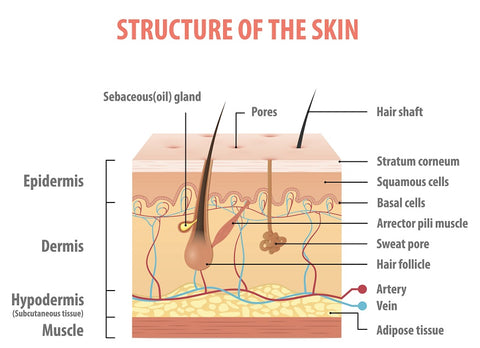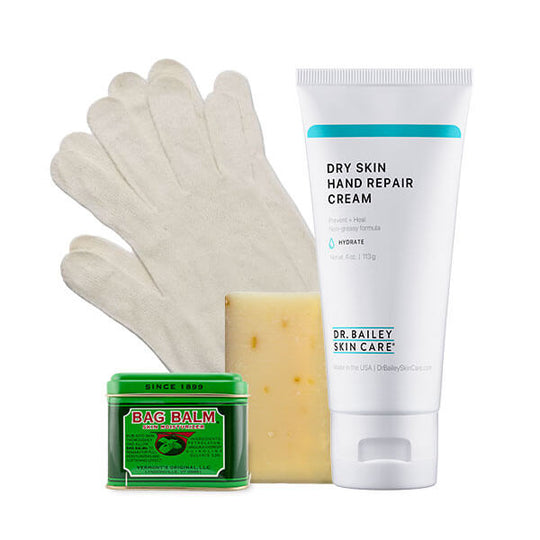Do I Have Sensitive Skin? Find out with Dr. Bailey

Knowing the top dermatologist-recommended skin care tips and products to treat your skin will help control your skin’s sensitivity. There are key ingredients and steps in your skin care routine that make a big difference in healing your skin. By understanding where these ‘leverage points’ are, you can reduce skin sensitivity and help build a stronger skin barrier to reduce irritation and discomfort going forward.
Is your skin a little … sensitive?
You are not alone; sensitive skin is common!
What is Sensitive Skin?
Sensitive skin is reactive skin.

If your skin is sensitive, it will react to skin care product ingredients, chemicals and environmental conditions (such as harsh weather or temperature extremes), stings, feels tight, tingles, itches or burns. The neurosensory discomfort may or may not be associated with visible changes of irritation, redness or dryness on the skin.
This can be caused by skin allergy (such as a rash from fragrance ingredients.) Or your sensitivity may be due to irritated skin (for instance, acne treatments like benzoyl peroxide or glycolic acid can cause a rash or chapped skin). It can also be caused by underlying skin problems such as rosacea and eczema. And, then there are times when a person has sensitive skin but we don’t know why, it just is!
Yes, it is common.
Studies vary, but adults who describe their skin as sensitive range from 30% of the population to upwards of 80%. Facial skin is the area most likely to be sensitive.
Skin sensitivity is more likely:
- In women than men though both are significantly impacted
- Due to breakouts in premenopausal women and in men after shaving
- To include blushing and vascular reactivity in people with fair skin
- To occur in the presence of sun sensitivity

It is also more likely to be associated with dry skin and an atopic predisposition (meaning in people with a personal or family history of seasonal allergies, asthma, atopic dermatitis type of eczema, keratosis pilaris and/or a form of extremely dry skin called ichthyosis vulgaris).
And, believe it or not, your skin's sensitivity declines with age! That’s one thing everyone with the condition can look forward to.
Your Skin Will Have a Weaker Skin Barrier and is Usually more Permeable than Normal Skin.

This means that the epidermis, which is your skin's barrier, is less reliable than normal. It allows water in your skin to escape. We measure this as Transepidermal water loss (TEWL) and people with skin sensitivity have higher TEWL at baseline – meaning that your skin’s normal state is to have a weaker skin barrier.
What Does it Mean to Have a Higher Transepidermal Water Loss (TEWL)?
Having a high TEWL has two main disadvantages:
- Your body’s important natural moisture escapes faster leaving skin dehydrated, and
- Harsh ingredients penetrate into your skin more readily.
People with sensitive skin have lower ceramide levels in facial skin.
They also have lower Natural Moisturizing Factor (NMF), fatty acids and they have more overall skin dryness. You can replenish these key barrier components using the right skin moisturizer. It's also important to know that even people with oily skin can have sensitive and dehydrated skin – they are not mutually exclusive.
Having the condition can negatively impact the quality of one’s life.
This is because it’s uncomfortable and proven to adversely impact the quality of one’s life. Helping to ease irritability and symptoms is important!
The good news is you can improve this “compromised skin barrier” and associated neurosensory discomfort. The key is to consistently treat your skin gently, replenish skin’s moisture and booster skin barrier components. I call this treatment a “hydrating gentle skin care routine” and it’s the single most effective way to keep your skin healthy. - Dermatologist Dr. Cynthia Bailey
Here are the 4 Dermatologist Recommendations on How to Care for Sensitive Skin:
-
Use only gentle skin cleansers.

- Use only hypoallergenic products (those that don’t have irritating ingredients, fragrances and ingredients that might be allergens – even ‘natural’ ones like citrus).
- Use warm (not steamy hot) water on your skin.
- Apply a deeply hydrating moisturizer right after toweling your skin dry.
Here’s how to do it:
The best skin care regimen and products
1. Use only gentle skin cleansers
Apply gentle skin cleansers and use them only where you need them. Rinse them off your skin thoroughly with warm (not steamy hot) water. This helps to protect the precious ceramides and other lipids that make up an important part of your skin’s epidermal barrier (aka your waterproofing layer!). Harsh cleansers can eventually also denature keratin protein – the other key element of your skin’s barrier.
Best specialized soap and cleanser on your face and body:
You probably don’t need as much soap as you think! Use your cleanser/soap to lather-up only the parts of your skin that are soiled or have body odor glands (you know where they are!). This includes your armpits, groin, buttocks, and feet. If you have oily skin, you also need to use cleanser on the oily areas of your back, neck, and chest.
Product picks from my practice: Vanicream Cleansing Bar and Naturally Best Bar Soap. Other product options include naturally made unscented glycerin soaps or Dove Unscented Bar Soap.
Best facial cleanser:
Use the mildest cleanser that does the job. Beware of that tight “squeaky-clean” feeling after washing. That feeling means you’ve removed too much of your natural oils and actually irritated your skin.
Product picks from my practice: Extremely Gentle Foaming Facial Cleanser (my personal favorite) or Vanicream Cleansing Bar. These are pH balanced cleansers especially designed to cause the least irritation and balance natural oils that help retain moisture. Other options include Neutrogena Naturals Purifying Facial Cleanser, Aquanil Cleanser.
Best specialized cleanser and soap for your hands:
Given that you wash your hands so much in one day, I strongly recommend that you keep an unscented and gentle easy-rinse foaming soap near every sink. Cleanser dispensed in a foamer bottle is airy and light, rinsing off quickly to prevent retained soap residue. This is important because retained soap residue will continue to remove skin ceramides and lipids and eventually denature keratin protein – the perfect storm for damaged skin barrier!
Another tip is to apply hand cleanser only on your palms; the skin on the back of your hand rarely gets into germs and grime, and it’s much more fragile and prone to dryness. Also, take care to rinse all of the cleanser out from between your fingers where hand chapping often starts.
Product pick from my practice: Dry Hand Repair and Treatment Kit
2. Use only hypoallergenic skin care products.
Your skin will be more prone to react to taunting ingredients, which commonly include:
- Fragrances, including natural ones like citrus, ylang ylang and others
- Harsh preservatives used in skin care products, especially hair care products
- Anti-aging ingredients such as glycolic acid, vitamin C or retinoids
- Acne treating ingredients such as salicylic acid and benzoyl peroxide
- Some sunscreen ingredients (remember that chemical sunscreen ingredients can be irritating. Stick with mineral zinc oxide and titanium dioxide products, they give the best protection, are non-irritating, and are the sunscreens that dermatologists recommend for sensitive skin.)

The bottom line for healthy skincare:
Play it safe and use only gentle, hypoallergenic products for the majority of your skin care needs.
Go easy when you do want to include potentially irritating products or ingredients in your skin care routine. It does not mean you can’t use them; it just means you need to take good care of your skin when you do use them. - Dr. Bailey
This includes some of the most effective and well-loved acne care and age fighting skin care actives. Examples include glycolic acid (AHA), retinoids (retinol and prescription tretinoin), salicylic acid (BHA) and benzoyl peroxide.
Can I use glycolic acid, retinol or acne products?
Yes, but – you must counter irritation by using only a really gentle cleanser and diligently applying a good moisturizer after washing to promote a stronger skin barrier.
- For facial care, this means using products such as my Extremely Gentle Facial Cleanser and Daily Moisturizing Face Cream.
- For body skin care, this means using products that are gentle and hydrating such as my Naturally Best Bar Soap and Natural Face, Hand and Body Lotion.
3. Bathe and wash your skin in a hydrating way
Your bath or shower has the potential to either hydrate or dry out your skin. To make your shower or bath therapeutically hydrating, don’t strip your natural skin oils with hot water (remember that hot water cleans greasy dishes better than warm water).
Use only gentle soaps and cleansers on your skin and be sure to always rinse them off completely. - Dr. Bailey
Also, use them only where needed, meaning on the body-odor producing parts of your skin and the oily or soiled areas as I mentioned above.
4. Always apply a moisturizer to your skin after washing.
You need to apply a moisturizer “within the magic three minutes” of toweling your skin dry. This locks in water that your skin soaked in during the bathing process – the key to optimal skin hydration. Use hypoallergenic moisturizers with rich lipids (oils, ceramides, butters) and water-binding humectant ingredients (hyaluronic acid, glycerin, sodium PCA) that soak deeply into your skin.
The best moisturizer for your sensitive facial skin
Apply your facial moisturizer both morning and night after washing. Product picks from my practice include Daily Moisturizing Face Cream and Omega Enriched Booster Oil either used alone or with a few drops of oil added to your moisturizer to enhance lipid replenishment and sooth irritation.
Other options include Aveeno Cream or Lotion, CeraVe Cream or Lotion, and Clinique Dramatically Different Lotion Plus.
The best hand creams
As highlighted earlier, since you wash your hands often during the day, you need to keep a hand moisturizer by every sink so you can moisturize many times throughout your day.
Product picks from my practice include Dr. Bailey Dry Skin Hand Cream. For severely chapped hands use my Dry Skin Hand Repair Kit which includes my Dry Skin Hand Cream, Bag Balm, my Naturally Best Bar Soap and the best therapeutic cotton gloves to help soak in Bag Balm while you sleep.
Other options include ShiKai Borage Hand Cream or Aquaphor Healing Ointment.
Best body moisturizer
Apply body cream or lotion after every shower. Select a richly hydrating product without fragrance. Product picks from my practice include my Natural Face, Hand and Body Lotion and my Natural Face and Body Butter Cream.
Other options include Cetaphil Cream, pure petrolatum and coconut oil.
Best moisturizer for lips
Coat your lips daily with a hypoallergenic lip balm.
Did you know that ‘addiction to lip balm’ is a problem because many lip balms contain ingredients that actually trigger sensitive lip skin? It’s true. - Dr. Bailey
Stick with the moisturizing ingredients and avoid the flavors or ‘magic healing botanical essences’ that taunt lip allergy (called allergic cheilitis). Product pick from my practice include my Natural Lip Balm.
Other options include pure shea butter or 100% petrolatum Vaseline Ointment.
The bottom line on these moisturizers:
Keep it simple and deeply hydrating with lipids and/or barrier restoring ceramides and humectants. Avoid fragrance and taunting botanical essences. Apply moisturizer within the magic 3 minutes after toweling skin dry to hydrate skin and heal skin barrier – the key to a dermatologist’s care routine.
How to pick a sunscreen that works for you.

Sensitive skin is often linked with excessive sun sensitivity. Remember, dermatologists recommend that you apply a broad-spectrum sunscreen to all of your sun-exposed skin 365 days a year. This means that you need to find a product that your skin loves.
Sensitive skin should use only pure mineral sunscreens in my professional opinion and clinical observations over 35 years of practice! - Dr. Bailey
Best sunscreens
Zinc oxide and titanium dioxide mineral sun protection is hypoallergenic and perfect for delicate skin! My top picks for those who are super sensitive are the pure mineral zinc oxide products.
Product picks from my practice include Sheer Strength Pure Physical Matte Tinted SPF 30 Facial Sunscreen for daily use. Sheer Strength Pure Physical Water-Resistant SPF 50 is ideal for neck, chest, the back of your hands and all over use. It is light weight, non-greasy and elegant enough for daily wear. The water-resistant base means that this is perfect for activities that are wet or sweaty.
Sensitive skin can be a challenge. The good news is, once you follow a routine and use the right products, you’ll have healthy, happy skin in no time.
References:
Farage MA: How do perceptions of sensitive skin differ at different anatomical sites? An epidemiological study. Clin Exp Dermatol 2009;34:e521-e530.
Guinot C, Malvy D, Mauger E, Ezzedine K, Latreille J, Ambroisine L, et al: Self-reported skin sensitivity in a general adult population in France: data of the SU.VI.MAX cohort. J Eur Acad Dermatol Venereol 2006;20:380-390.
Misery L, Myon E, Martin N, Verriere F, Nocera T, Taieb C: Sensitive skins in France: an epidemiological approach (in French). Ann Dermatol Venereol 2005;132:425-429.
Willis CM, Shaw S, De Lacharriere O, Baverel M, Reiche L, Jourdain R, et al: Sensitive skin: an epidemiological study. Br J Dermatol 2001;145:258-263
Richters R, Falcone D, Uzunbajakava N, Verkruysse W, van Erp P, van de Kerkhof P, What Is Sensitive Skin? A Systematic Literature Review of Objective Measurements Skin Pharmacol Physiol 2015;28:75-83 https://doi.org/10.1159/000363149
An S, Lee E, Kim S, Nam G, Lee H, Moon S, et al: Comparison and correlation between stinging responses to lactic acid and bioengineering parameters. Contact Dermatitis 2007;57:158-162.
Cho HJ, Chung BY, Lee HB, Kim HO, Park CW, Lee CH: Quantitative study of stratum corneum ceramides contents in patients with sensitive skin. J Dermatol 2012;39:295-300.
Sparavigna A, Di Pietro A, Setaro M: ‘Healthy skin': significance and results of an Italian study on healthy population with particular regard to ‘sensitive' skin. Int J Cosmet Sci 2005;27:327-331.
Roussaki-Schulze AV, Zafiriou E, Nikoulis D, Klimi E, Rallis E, Zintzaras E: Objective biophysical findings in patients with sensitive skin. Drugs Exp Clin Res 2005;31(suppl): 17-24.
Laurent Misery, MD, Hopital de Brest, Brest, France; T-F Nocera-Verierre, MD, Avene Laboratory, Lavaur, France; Eric Myon, PhD, Charles Taieb, Sensitive skin: Quality of life impact, POSTER DISCUSSION SESSION 495—PEDIATRICS| VOLUME 52, ISSUE 3, SUPPLEMENT , P107, MARCH 01, 2005
Stacy S. Hawkins PhD and Vickie Foy BS, The Spectrum of Sensitive Skin: Considerations for Skin Care in Vulnerable Populations, J Drugs Dermatol. 2019;18(1 Suppl):s68-74,
















